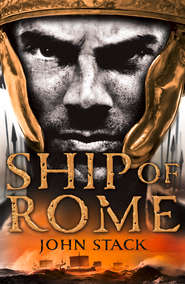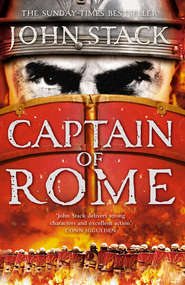По всем вопросам обращайтесь на: info@litportal.ru
(©) 2003-2025.
✖
Masters of the Sea Trilogy: Ship of Rome, Captain of Rome, Master of Rome
Автор
Год написания книги
2019
Настройки чтения
Размер шрифта
Высота строк
Поля
He was wrong.
‘Guard commander!’ Gisco suddenly ordered, breaking the heavy silence. ‘This man disobeyed my orders, he must be punished. Seize him.’
Cronus looked at two of the guards and jerked his head towards the captain. They immediately rushed forward and grabbed his arms. Maghreb’s initial shock at the admiral’s words gave way to fear and he struggled against the men holding him.
‘But …’ he pleaded, fear consuming him, his mind unable to comprehend the admiral’s actions, ‘you said yourself, I couldn’t have known of the Romans’ trap. We were taken by surprise. We—’
‘Enough!’ Gisco bellowed, cutting across the captain’s pleas. ‘You were ordered to continue your pursuit of the Roman vessel. You did not and they escaped. There are no excuses.’
‘But …’ Maghreb began again, hopelessness overwhelming him.
‘Take him away, Commander,’ Gisco ordered. ‘Have him straddle the ram.’
The pronounced sentence instantly silenced Maghreb, an overwhelming wave of terror engulfing him. Cronus saluted and led the condemned man from the cabin.
Hamilcar had watched the entire exchange with disbelief. In the two months since being appointed to shadow Gisco, he had become increasingly aware of the man’s serpentine nature. Hamilcar had witnessed scenes like this before and as always his honour was offended by Gisco’s methods. The admiral always lulled an enemy before striking and Hamilcar knew it served no purpose other than to satisfy Gisco’s ego.
The admiral noticed Hamilcar’s expression as he sat back down behind his desk. The captain’s renewed cries for mercy could be heard through the cabin door as he was dragged up onto the deck above and brought forward to meet his fate.
‘You disapprove, Barca?’
Hamilcar kept his peace, sensing Gisco’s dislike for his position, knowing the admiral wanted to provoke a confrontation to justify his actions.
‘Let me tell you something, young man,’ Gisco began, his voice patronizing. ‘Fear is what drives men. Fear of failure. Fear of retribution. Fear of—’
‘Hannibal Gisco?’ Hamilcar interrupted, his own censure evident in every word.
‘Yes,’ Gisco replied, as if trying to explain his reasoning to an obtuse child, ‘fear of Hannibal Gisco. Maghreb was ordered to hunt down the Roman galley and he failed. Now he will pay for that failure with his life.’
Hamilcar bit back his retort, knowing the futility of arguing against a man such as Gisco. The man had no honour, no sense of the true motivation of men, the drive that inspires them to create and control an empire. He got up slowly from the couch, sensing the admiral’s dismissive gaze as he moved towards the door. He walked out without a word, glad to be out of Gisco’s company.
Hamilcar reached the deck as Cronus and two others were climbing back over the forerail. Hamilcar walked down the length of the galley, ignoring the guard commander as they passed each other amidships. By the time he reached the foredeck, Cronus had issued the order for the Melqart to get back under way. Hamilcar looked over the forerail to the figure of Maghreb below. He was tied in a supine position, face up, over the six-foot ram of the galley. With the ship at rest, half of his body was submerged under the water; however, as the quinquereme picked up speed to reach standard, the waves began to crash over him. Maghreb would drown slowly. Very slowly.
Hamilcar watched in dread fascination as Maghreb tried to draw breath between waves. An errant crest filled his mouth with water and he coughed and spluttered to clear his tortured lungs. He gained a moment’s respite but within a minute he was caught again. Maghreb threw his face up and Hamilcar was given a vision of pure terror. A cry of anguish was cut short by the cold sea, her unending current oblivious to the fate of the terrified captain. Maghreb cleared his throat again but all the while his lungs continued to fill with water.
At standard speed, in calm coastal waters, Hamilcar estimated it would take at least thirty minutes for Maghreb to drown. The Melqart was flanked on both sides by other galleys, many of their crew lining the rails to witness the captain’s punishment. Hamilcar could see from their expressions that Gisco was achieving his aim of inspiring fear in the heart of each man. Maghreb was silent, his thrashing arms and manic face the only testament to his futile struggle against the sea. Hamilcar stepped back from the forerail, hiding the captain from his line of sight.
Hamilcar had spent the first ten years of his military career in Iberia, stationed in Malaka on the southern coast. It was the frontier of the Carthaginian empire, a new expansion being forged from the lands of the Celts who had formerly controlled the isolated peninsula. Hamilcar had made his name and cemented his standing amongst the ancestors of his ancient line in that campaign. The fight had been brutal, the territory hard fought and won. Hamilcar had led many men to their deaths, had ruthlessly thrown them against the relentless attacks of the Celts in an effort to secure victory. But always with honour, always with the strength of his men harnessed through loyalty to Carthage and their commander.
Hamilcar had yet to meet the Romans in battle. Years before, Carthage and Rome had fought together as allies against Pyrrhus of Epirus. It was an alliance that precipitated the current conflict, a once-honourable union that Rome had established to save her lands before turning the allied victory into a dishonourable invasion of Sicily on a pretext of saving the people of Messina from the armies of Syracuse, an invasion that threatened Carthage’s extensive commercial interests on the island.
The die was now cast. The Roman trireme had escaped and so it was only a matter of time before Hamilcar would face the enemy in battle. His gaze hardened at the thought, savouring the anticipation of expelling the Romans from Sicily, re-establishing the supremacy of his people as masters of the Mediterranean.
A guard detail of sixty legionaries, half a full maniple, stood in formation in the courtyard of the villa with a centurion walking up and down the ranks inspecting the men. A signifer stood at the head of the formation, holding aloft the maniple’s standard. The gentle offshore breeze ruffled the cloth of the standard, the gold discs hanging beneath clinking against each other like wind chimes. Septimus studied it and saw the symbol of a bull, marking it as a maniple of the Second legion, one of the four now campaigning in Sicily. Septimus had belonged to the Ninth Legion, encamped with the Second just beyond the town of Brolium. The other two legions, the Sixth and Seventh, were stationed further south, near the border with Syracuse, a politically motivated location meant to keep Hiero II, the king of Syracuse, bottled up. Their static location meant the two legions at Brolium would bear the brunt of the spring campaign.
The inspecting centurion looked past his men to the entrance of the courtyard, spotting Septimus and Atticus. He approached them with the confident, measured stride of a manipular centurion, a man totally at ease with his command and certain of his place in life.
‘Identify yourselves!’ he demanded of the two men.
‘Captain Perennis of the trireme Aquila, and Centurion Capito of the marines,’ Septimus announced, ‘reporting as ordered by the senior consul.’
The centurion grunted, his opinion of sailors and marines clearly written across his face. Septimus ignored the implied slur, although he marked the centurion’s face in his mind.
‘Fall into the front rank,’ the legionary commanded. ‘The consul is on his way.’
Atticus and Septimus walked forward and took their place in the formation of soldiers. The centurion took one last look at his assembled men before standing to the fore of the group, the signifer behind and to his left. All waited motionless for the consul to appear.
Scipio arrived five minutes later. He was followed by his guard commander and the twelve men of his personal guard, the praetoriani. Their distinctive black travelling cloaks billowed around them as they marched in step behind their master. The consul flicked his hand upwards and the guard commander called the soldiers to a halt, the hobnails of their sandals reverberating in the quiet of the afternoon air. Scipio walked on alone to inspect the demi-maniple of legionaries. He sensed and relished the stillness of the troops before him, their discipline and uniformity evoking memories of his own time in the legions, a simpler time when rules and orders dictated all his actions, just as they did for the men before him. He noticed the two commanders from the Aquila in the front rank of the formation, noticed that they were still in full battle armour. They kept and wore their armour well, although both showed signs of battles fought.
The sound of a horse’s snort caused Scipio to turn. A stable lad was leading a grey-white stallion across the courtyard to the assembled men. The horse was Andalusian, a Spanish horse, sixteen hands high. He had been warmed up and groomed and he scraped the flagstones with his right hoof, his body a mass of restrained energy. Scipio walked over to the horse and patted his crest and throat, talking gently to the stallion in the practised tone of a seasoned horseman.
‘A magnificent beast,’ he said to no one in particular before mounting.
The senior consul settled himself comfortably in the saddle and turned the horse around to face the demi-maniple. He noticed immediately that his mount was a warhorse, the animal responding to movements in Scipio’s legs and shifts in his body weight. In battle, the rider would be free to wield weapons in both hands, the horse not relying on the reins for guidance.
‘Form up!’ Scipio ordered the centurion, before wheeling the horse around.
‘Marching column!’ the centurion roared, and the demi-maniple transformed itself into twenty rows of three men abreast. Atticus and Septimus were in the front row, the naval captain thankful that he didn’t have to move for the column to form up, unfamiliar as he was with the finer points of legionary drill manoeuvres.
The consul’s guard led the march out through the double doors of the courtyard, followed by Scipio, who needed to duck beneath the overhead arch of the gateway. The demi-maniple of the Second followed, wheeling right as they left the courtyard to take the winding road down to the docks two miles away. The streets were empty before them, doors and shutters closed to hide the inhabitants within. The townspeople were used to seeing Roman soldiers in Brolium; however, the menacing sight of the black-cloaked guard of the praetoriani and the obvious importance of the Roman they escorted prompted the people to hide in trepidation.
The column wound its way out of the town of Brolium and set out on the road south to the encampment. The road was busy, with the constant flow of traders moving between the port town and the lucrative opportunities of the legions’ base camp. All stepped aside as the marching column of soldiers approached, many manhandling their carts from the ten-foot-wide dust road into the fields on either side. They stared in awe at the sight of Scipio riding gloriously in the evening sun, his bearing and perfect features heralding his wealth and stature, while the size of his escort announced his importance for all the world to see.
The Roman encampment was located a mile south of Brolium. The camp was the Second and Ninth legions’ castra hiberna, their winter camp, and was a semi-permanent structure suitable for the soldiers’ extended stay in the cold months. Even now the weather heralded the arrival of spring, when Ceres’s vibrant touch would transform nature in celebration of Proserpina’s return to the world from her winter exile in Hades. The arrival of spring would also herald the beginning of the legions’ campaign season, and soon the Romans would march away from Brolium to carry the fight to the Carthaginians holding the western half of Sicily. If they were successful they would not return and a new castra hiberna would be constructed deep in what was now enemy territory.
As the column approached the encampment, they passed the advanced stations of the legions. These guard posts were located two hundred yards from the camp on each approach road and were manned by four legionaries. Septimus could see that they had been forewarned of the consul’s possible arrival, as all four soldiers stood to attention outside the guard hut where normally one would stand while the other three rested inside. They did not challenge the column but let it pass in silence, their eyes looking straight ahead, not daring to look up at Scipio for fear of drawing his attention.
The main camp was rectangular in shape, built of two squares, one for each legion, and the long axis of the camp ran parallel to the road. The whole area was surrounded by a deep trench, fifteen feet across and five deep with the excavated earth thrown inward to form a formidable rampart, on top of which stood the wall. Near the main gate, the Porta Praetoria, the wall had been reinforced with stone; however, the majority of the palisade was constructed from wooden stakes cut from young oak trees. The branches of the stakes had been sharpened and interwoven with each other to form a near-impenetrable obstacle, and at each corner of the rectangle a twenty-foot-high watchtower stood, giving the sentries advance warning of any approaching force on the uninterrupted surface of the valley floor.
The column passed through the open gates of the camp, again without challenge or check, to be confronted, immediately inside the walls, by the massed ranks of the Second and Ninth legions. They had been drawn up in manipular formation; a legion stood on each side of the road running directly down the centre of the camp to the officers’ quarters in the centre. As Scipio rode under the archway of the gate, the legionaries roared with one voice:
‘Rome Victorious!’
Scipio rode on at the measured pace of the march, never looking left or right. A man born to command, the blood rushed in his veins at the sound of twenty thousand shouting in his honour. His expression was imperial, a look of fraternal pride, as if each man before him was a younger brother, a brother of Rome. Drawn up across the road before him were the senior officers of the legions. The commander of the praetoriani called a halt to the column and Scipio dismounted, covering the last few steps of the journey on foot.
‘Greetings, Senior Consul,’ a tall authoritative man at the head of the officers declared. ‘Welcome to Sicily.’ He was Lucius Postumius Megellus, legate of the Roman legions and a member of the Senate.
‘Thank you, Lucius,’ Scipio replied, his words genuine. Scipio had spent the past seven years in the Senate, all the while gaining in influence and power. His rise had given him many enemies, and on more than one occasion the man before him had clashed with him, but always honourably, always without subterfuge, and for that Scipio respected him.
Legate Megellus turned to introduce Scipio to the assembled officers. The introductions were brief, the salutes formal and exact.
Septimus ignored the confluence of senior officers before him, his gaze firmly fixed on the banners held aloft over the legion to his left. The preying wolf of the Ninth looked balefully from each linen standard, its eyes locked on a former son of the ranks. Septimus had not seen the Ninth in over a year, his reassignment to the Aquila severing his link to the only legion he had ever known. He remembered the moment acutely, the moment of choice so many months before, the decision to accept a promotion to centurion in the marines over remaining as optio of the IV maniple. It was a decision he had wrestled over but once made he had never looked back. Until now.
Septimus searched the ranks for the signifer of the IV maniple, suddenly feeling the need to reconnect to his old command and the standard he had fought and lived under for so many years. The order to advance the column was given as he found his mark deep within the ranks, the men beneath the banner of the IV hidden by the mass of soldiers around them.
‘How reliable is this man’s word?’ Legate Megellus asked, his question directed at the port commander.
‘Captain Perennis has been in Rome’s service for fifteen years. I have personally known him for ten. His word is beyond question,’ the commander answered, confidence in his voice as he looked over at the young captain.









